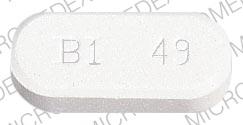Respbid Disease Interactions
There are 7 disease interactions with Respbid (theophylline).
Methylxanthines (applies to Respbid) PUD
Major Potential Hazard, High plausibility. Applicable conditions: Peptic Ulcer
Methylxanthines are known to stimulate peptic acid secretion. Therapy with products containing methylxanthines should be administered with extreme caution in patients with active peptic ulcer disease. Some manufacturers consider their use to be contraindicated under such circumstance.
Methylxanthines (applies to Respbid) renal dysfunction
Major Potential Hazard, Moderate plausibility.
The metabolites of theophylline, which are generally undetectable in patients with normal renal function, may accumulate in patients with renal impairment and contribute to the toxicity of theophylline. In addition, the plasma protein binding of theophylline may be significantly decreased in renal impairment, resulting in elevated free drug concentrations and further increasing the risk of toxicity. Therapy with theophyllines should be administered cautiously in patients with impaired renal function. Dosage adjustments and more intensive monitoring of serum theophylline concentrations may be required.
Methylxanthines (applies to Respbid) seizure disorders
Major Potential Hazard, High plausibility. Applicable conditions: Seizures, Head Injury, Cerebral Vascular Disorder
The use of theophyllines is considered by some manufacturers to be contraindicated in patients with underlying seizure disorders unless they are receiving adequate anticonvulsant therapy. Theophyllines may cause seizures, which have generally been associated with toxic drug levels but have also been reported at therapeutic concentrations in patients with head trauma or cerebral infarct. If theophylline therapy is administered in patients with these or other risk factors for seizures, serum drug levels should be monitored closely and maintained in the low therapeutic range. Intractable seizures and death have been reported during acute theophylline toxicity.
Methylxanthines (applies to Respbid) GERD
Moderate Potential Hazard, High plausibility. Applicable conditions: Gastroesophageal Reflux Disease
Methylxanthines increase gastric acidity and may also relax lower esophageal sphincter, which can lead to gastric reflux into the esophagus. Therapy with products containing methylxanthines should be administered cautiously in patients with significant gastroesophageal reflux.
Methylxanthines (applies to Respbid) hemodialysis
Moderate Potential Hazard, High plausibility.
Theophylline is removed by hemodialysis. Doses should either be scheduled for administration after dialysis or supplemental doses be given after dialysis.
Methylxanthines (applies to Respbid) reduced clearance
Moderate Potential Hazard, High plausibility. Applicable conditions: Congestive Heart Failure, Pulmonary Edema, Cor Pulmonale, Liver Disease, Shock, Influenza, Fever, Hypothyroidism, Panhypopituitarism
Certain conditions have been identified as causes of reduced theophylline clearance. They include age (neonates and infants < 1 year as well as elderly patients > 60 years) and the following concurrent diseases: acute pulmonary edema; decompensated heart failure; cor pulmonale; fever (>= 102 degrees for 24 hours or more, or lesser temperature elevations for longer periods); influenza; untreated or uncontrolled hypothyroidism; liver disease, cirrhosis or acute hepatitis; reduced renal function in infants < 3 months of age; sepsis with multi-organ failure; and shock. Therapy with theophyllines should be administered cautiously in patients presenting with one or more of these risk factors, and the dosage should be appropriately reduced to prevent toxicity. More intensive monitoring of serum theophylline concentrations may be required. Toxicity is most likely to occur when levels exceed 20 mcg/mL. Severe cases, sometimes without previous warning, have led to cardiac arrhythmias, intractable seizures, and death.
Methylxanthines (applies to Respbid) tachyarrhythmias
Moderate Potential Hazard, Moderate plausibility. Applicable conditions: Angina Pectoris, Myocardial Infarction, Post MI Syndrome, Hypertension, Hyperthyroidism
The use of theophyllines is associated with an increase in heart rate which may progress to supraventricular tachycardia or ventricular arrhythmia at high serum drug concentrations. Appearance of cardiac adverse effects is generally an indication of theophylline toxicity, although patients with a history of tachyarrhythmias may be more susceptible to the chronotropic effect of these drugs. Therapy with theophyllines should be administered cautiously in such patients. Caution is also advised in patients with hypertension, hyperthyroidism, angina pectoris, or recent myocardial infarction, since high dosages of the drugs are associated with positive inotropic as well as chronotropic effects. Clinical monitoring of serum drug concentrations is recommended to prevent toxicity.
Switch to professional interaction data
Respbid drug interactions
There are 322 drug interactions with Respbid (theophylline).
Respbid alcohol/food interactions
There are 4 alcohol/food interactions with Respbid (theophylline).
More about Respbid (theophylline)
- Check interactions
- Compare alternatives
- Drug images
- Side effects
- Dosage information
- During pregnancy
- Drug class: methylxanthines
- Breastfeeding
Related treatment guides
Drug Interaction Classification
| Highly clinically significant. Avoid combinations; the risk of the interaction outweighs the benefit. | |
| Moderately clinically significant. Usually avoid combinations; use it only under special circumstances. | |
| Minimally clinically significant. Minimize risk; assess risk and consider an alternative drug, take steps to circumvent the interaction risk and/or institute a monitoring plan. | |
| No interaction information available. |
See also:
Further information
Always consult your healthcare provider to ensure the information displayed on this page applies to your personal circumstances.


